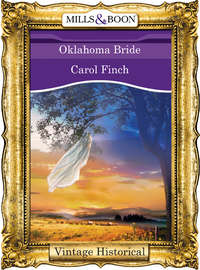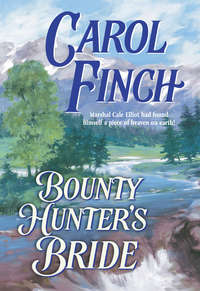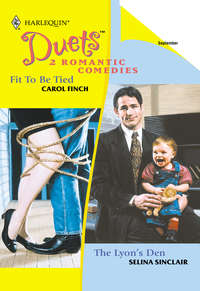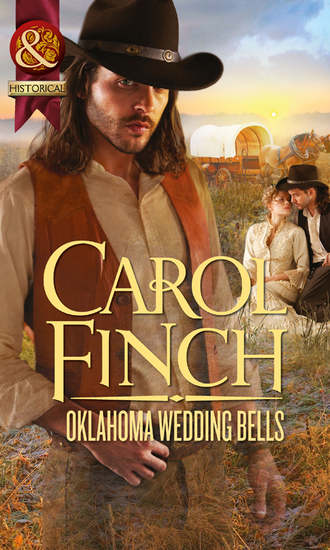
Полная версия
Oklahoma Wedding Bells

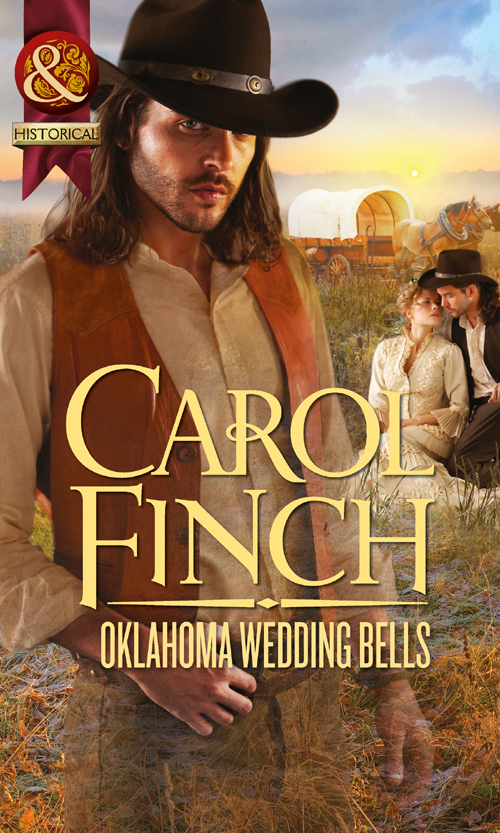
Praise for Carol Finch:
‘Carol Finch is known for lightning-fast, rollercoaster-ride adventure romances that are brimming over with a large cast of characters and dozens of perilous escapades.’
—RT Book Reviews
THE LONE RANCHER
‘A wild Western complete with snappy dialogue, laugh-out-loud humour, crazy escapades, danger, and most of all passion.’
—RT Book Reviews
BANDIT LAWMAN, TEXAS BRIDE
‘Finch has made her reputation on wonderfully realistic and humorous Westerns filled with biting repartee and non-stop action. She’s at her finest with this action-packed tale of a lawman and a spitfire.’
—RT Book Reviews
TEXAS RANGER, RUNAWAY HEIRESS
‘Finch offers another heartwarming Western romance full of suspense, humour and strong characters.’
—RT Book Reviews
LADY RENEGADE
‘Finch’s forte, verbal repartee, is at its best here. With well-developed characters and a quick pace, this tale is highly reminiscent of her classic Westerns.’
—RT Book Reviews
“Are you proposing to me? Isn’t that unconventional in white society?”
“Where is it written that a woman can’t propose?” Josie challenged quietly.
“Nowhere I know. It’s what I’d expect from a misfit like you … So I accept.”
He draped his arm familiarly over her shoulder, drawing her closer. Ordinarily she was inclined to step away when a man crowded her space. Oddly enough, however, she didn’t object to Tremain’s feigned display of affection.
“You know this is going to cost you, don’t you?” he whispered devilishly.
“How much, Tremain?” she asked, when she saw the wicked gleam in his sea-green eyes and noticed the ornery grin twitching his lips. “I’m saving my funds for improvements on my homestead—if I manage to stake one.”
“We’ll work something out, trust me.”
“Just so you know, I don’t trust any man’s intentions …”
Her voice trailed off when his raven head came slowly and deliberately toward hers. Then he kissed her, satisfying her curiosity—and stirring something wild and hungry deep inside her.
About the Author
CAROL FINCH, who also writes as Gina Robins, Debra Falcon, Connie Drake and Connie Feddersen, has penned over seventy novels in the historical romance, contemporary, mystery and romantic suspense genres. A former tennis pro and high school biology instructor, she devotes herself full-time to writing and working on the family’s cattle ranch in Oklahoma.
Oklahoma
Wedding Bells
Carol Finch

www.millsandboon.co.uk
This book is dedicated to my husband, Ed, and our
children Jill, Jon, Christie, Durk, Shawnna, and Kurt.
And to our grandchildren, Livia, Blake,
Kennedy, and Brooklynn. And to Kurt
and Shawnna’s children whenever they may be.
With much love.
Chapter One
El Reno, Oklahoma Territory April 1892
Josephine Malloy sat on a rickety wooden bench in the tent city near the river. With practiced strokes, she replaced a button on a worn shirt that would have served better as a rag. Beside her, Muriel Wilson stitched a patch on a tattered jacket for one of their many male customers.
“Brace yourself, Josie,” Muriel murmured confidentially when Orson Barnes approached.
Josie inwardly groaned when the big, burly cowboy lumbered toward her. Orson claimed to be twenty-nine, but with a woolly brown beard and mustache covering his face, and a frizzy crop of dark hair surrounding his broad head, it was hard to tell his age. She took his word for it.
Muriel nudged her discreetly. “Why don’t you put the poor man out of his misery before he spends all his money ripping buttons off his shirts so you can sew them back on?”
“I’m hoping he’ll run out of extra spending money before he works up the nerve to pop the question,” she mumbled.
Orson was one of the self-appointed leaders in the tent community—a former soldier who was well respected by the hopeful settlers. Yet he was exceptionally bashful around women. Josie had listened to Orson stammer and hint that a man needed a wife, and that he would be a protective provider and landowner after the run. Maybe today would be the day he proposed and she rejected him….
Her thoughts trailed off when Orson halted in front of her, casting his broad shadow over her. “Mornin’, Miz Malloy. You, too, Miz Wilson.” His wide smile exposed the noticeable gap between his two front teeth.
Orson chitchatted about the weather and the upcoming race to stake free land in the area that had once belonged to the Cheyenne and Arapaho tribes. Then he inhaled an enormous breath that made his barrel chest double in size. “Miz Malloy, as you’ve likely noticed, I’ve become quite fond of you while you’ve done mending for me.”
Here it comes, Josie thought with an inward wince.
“If you’ll do me the honor of being my wife after the run, we can stake our one-hundred-sixty-acre claims side by side and have twice as much land to start our new ranch.”
Same proposal, one hundredth verse. No, she silently corrected, one hundred two. Muriel was at ninety-nine. With literally thousands of single men swarming the area to chase dreams of building ranches on free land, Josie and Muriel were constantly bombarded with marriage proposals.
It was nothing new, however, Josie reminded herself. She had rejected several hundred proposals before participating in the race for land to help her brother and sister-in-law in the Run of ’89….
She was jolted back to the present when Muriel elbowed her in the ribs. Josie raised her gaze to meet Orson’s expectant eyes.
“You are too kind to offer for me, Orson. But I don’t consider myself good wife material and neither should you,” she replied, repeating the practiced rejection speech she’d given literally hundreds of times before. “If you knew me better you would realize I’m much too independent, outspoken and contrary to be a dutiful wife. In addition, it’s my dream to have a ranch all my own.”
Beside her, Muriel muffled a chuckle with a cough. Josie wasn’t sure which quality—her independence, frank speech or contrariness—amused her friend more. She had witnessed examples of each since they had become acquainted and formed their sewing partnership three weeks earlier. At twenty-one, Muriel was well on her way to perfecting those characteristics herself.
As Josie’s older brother was fond of saying, a man who tangled with an independent, free-spirited woman had no idea what he was getting himself into. Nevertheless, Noah had married Celia, who was no shrinking violet.
Orson’s buffalo-size shoulders slumped dejectedly as he curled and uncurled the brim of his sweat-stained hat in his meaty fists. “Maybe if we spent a little more private time together—”
Josie thrust his mended shirt at him. “No, Orson,” she said as gently—but firmly—as possible. “I’ll accept payment for repairing this garment, but I can’t accept your proposal. It wouldn’t be fair to you. I’m very sure that you’ll be much happier with someone else.”
As had happened often in the past three weeks, her rejected suitor turned to the brunette beside her and flashed his best smile. If Josie or Muriel rejected a man’s proposal, he’d immediately transfer his attention to the other woman, as if they were interchangeable. Which served to prove that a man wasn’t very particular about whom he acquired for his wife. One female was as good as the next, and Josie refused to let herself forget that.
There were a few exceptions, she conceded. Her brother actually loved Celia.
At twenty-three, Josie had become exceptionally cynical because of several unpleasant experiences with overeager single men who had hounded her before—and immediately after—land runs.
“How ‘bout you, Miz Wilson?” Orson asked hopefully. “We would suit well, too, I believe.”
“Thank you kindly, but no, Orson,” Muriel replied politely. “Like Josie, I fancy being on my own, and I’ve learned to take care of myself. I’m chasing my own rainbows and I’m not ready to settle down.”
“But you can double the amount of land—”
“No, thank you,” Josie and Muriel said in unison. “Good luck staking your land claim.”
After Orson glumly paid the fee, crammed his mended shirt under his arm and walked off, Josie came to her feet to work the kinks from her back. “I think I’ll hike into town for lunch. Want to come along?”
Muriel tucked the patched jacket in the knapsack where they kept their sewing supplies, then tossed the bundle into the tent she and Josie shared for their protection. “One hundred proposals and counting,” Muriel muttered. “And not one that interests me.”
“Maybe we’re too particular. Or shrewish,” Josie remarked as she walked alongside her friend. “Getting to know one another doesn’t appear to be a prerequisite for marriage in this territory. But I wish men would wait at least a week after making our acquaintance before proposing.”
“That didn’t bother Rachel Winters or Annabelle Mason.” Muriel smirked, her golden-brown eyes sparkling with humor. “They paraded up and down the streets in fine fashion to snag husbands. Neither of them knew their new grooms for more than a day before getting hitched. Though I wonder why they didn’t want to wait until after the run to wed. They could have staked their own claims and combined them with their husbands’ to double the size of their property.”
“There are opportunists galore milling about,” Josie insisted as she led the way up the tree-choked riverbank to reach the bustling community. “But I don’t blame the former saloon girls for trying to improve their situations, even if they hurried along their weddings. Extra land was the least of their concerns. They are in their late twenties, from the looks of them, and likely have endured a hard life. They were searching for an escape, while we are chasing our dreams of claiming homesteads of our own.”
“Mercy me,” Muriel muttered when they reached the edge of town. “There is that infuriating Captain Holbrook again. He’s always bossing folks around and running off the Sooners that sneak in to claim prime land before the day of the race.”
“I’m all in favor of routing those greedy settlers who are trying to cheat their way into acquiring the best property!” Josie insisted emphatically.
“So am I,” Muriel agreed. “But Holbrook’s domineering attitude riles me. He snapped at me, just because I wandered over the borderline while trying to avoid a clump of men tossing proposals left and right. The captain is too much the authoritarian and too full of himself, if you ask me.”
Josie glanced back and forth between her friend and the commander of Fort Reno, who was in charge of maintaining control of thousands of people who filled the town to overflowing, and was obliged to protect the Indians on the soon-to-be-opened land. “Has the captain insulted you or made improper advances?” she asked worriedly.
Muriel thrust out her chin, causing tendrils of dark hair to ripple around her face. Her thick-lashed eyes threw sparks. “He accused me of leading men on, is what he did!” she huffed irritably. “You know perfectly well that I can’t help it if ten cowboys decide to follow at my heels and toss out proposals simultaneously. The same holds true for you.”
That had become the story of their lives the past three weeks, Josie acknowledged.
“I’m trying to avoid men, not attract them.” Muriel snorted, and added spitefully, “I’d like to see that stuffed shirt of a soldier down on bended knee. I would smack him on the head with a skillet to punctuate my rejection.”
Muriel’s burst of temper befuddled Josie. She was also curious why the handsome captain cast Muriel the evil eye as he reined his horse toward her. With his shiny brown hair, brown eyes and muscular physique, Grant Holbrook was not unpleasant to look at. At age thirty or thereabout, he held a position of authority, and was highly regarded by his men. Why Muriel and the army officer provoked each other so easily was beyond Josie.
Captain Holbrook halted his roan gelding beside them and looked down from his advantageous position. He nodded politely to Josie, then focused a hard stare on Muriel. “What? No string of men trailing behind you today, Miz Wilson?” he said, and smirked. “Off day, is it?”
Muriel tossed him a caustic smile. “I sent them away because I’ve decided the only proposal I’ll accept is from you, Captain. I don’t want you to have to compete with the others, since it’s obvious you are so short on charm. Of course, my answer would still be no.”
“I wouldn’t ask,” he assured her crossly.
Muriel hitched her thumb toward Josie. “Then maybe you prefer blue-eyed blondes.”
“Don’t drag me into whatever personal feud you two have going,” Josie protested. “I, for one, will be relieved when the day of the run arrives so all these unattached men will have something better to do with their time than make a last-minute grab for a wife.
“I even passed out mail-order-bride magazines and matrimonial newspapers last week to divert attention from us, for all the good it did,” she added. She stared earnestly at Captain Holbrook. “Can’t you do something about the constant harassment? Muriel and I are tired of wading through would-be husbands to reach our destinations.”
He jerked up his head and frowned. “Has someone attacked you? Give me his name and I will deal with him severely.”
Josie noticed the captain directed his question and vow to Muriel. Hmmm … Wasn’t that interesting?
“I carry a knife as a deterrent,” Muriel replied. “I’ve managed to defend my own honor when the occasion arises.”
“Don’t stab anyone without provocation,” he warned. “I’d have to toss you in the stockade, and you might miss the run altogether. And why, may I ask, are you two racing off to claim property that you can’t possibly work by yourselves?”
Both of them puffed up with indignation. Apparently, this wasn’t the first time the captain had posed the question to Muriel, because she took extreme offense, even more so than Josie.
“Do I look incapable of fending for myself or setting up a temporary tent until I can hire someone to build my house?” Muriel challenged sharply. “I’ll have you know that I managed to work tirelessly as a seamstress and care for my ailing mother after my father died. We had to sell our farm and move into a run-down boardinghouse in town, but I did what had to be done until Mother passed on last winter. I long for what I had as a child. To that end I have saved every spare cent to make the run and to pay for farm improvements after I stake my claim!” Her voice rose indignantly. “I assure you, Captain High-and-Mighty Holbrook, this is not a whim!”
She dragged in a deep breath, crossed her arms over her chest and stared him down. “I doubt you know what it’s like to scratch and claw, Captain, but I do. Necessity demanded it. I’m chasing my long-held dream and it doesn’t include taking a husband who sees me as his cook, housekeeper, seamstress and personal harlot—”
Muriel clamped both hands over her mouth to halt her runaway tongue. The captain’s eyes nearly popped from their sockets. Josie burst out laughing.
Holbrook was first to regain his composure. He shifted on his horse, then looked down his patrician nose at Muriel. “Are you quite finished spouting comments that are considered improper in mixed company? If you had any manners you would know that.”
Josie’s gaze bounced from Muriel to the captain while the two exchanged blistering glares. They were so sensitive to what the other one said and did that they set off intense reactions in each other.
Ordinarily, Muriel took life in stride, as Josie did. A determined woman, she dealt efficiently with the throng of men hounding her with proposals. But poof! The captain arrived on the scene and Muriel bristled with hostility.
Josie had never been interested enough in a man to react to his words and glances the way Muriel did with Grant Holbrook. To Josie, the bothersome male masses were one more difficult obstacle to overcome on her way to establishing her own home and ranch in the soon-to-be-opened territory.
When Muriel wheeled around and stamped off, the captain scowled sourly, Josie saw. She hurried to catch up with her friend. “Feel better, now that you’ve put the commander in his place?”
“Much, thank you,” Muriel insisted, then dragged in a restorative breath. “Do you see why that arrogant soldier annoys me so much?”
“No, I don’t,” she said honestly.
Her friend stopped in her tracks to gape at her. “You don’t think he’s irritating beyond belief?”
“If you say so …” Josie’s voice trailed off when four men on the boardwalk spotted them. All smiles and eager anticipation, they surged forward like an ocean wave. But then she grinned, as a brilliant idea struck her. “Maybe we’re going about this the wrong way. Maybe we should accept a marriage proposal.”
Muriel stared at her as if she had vines sprouting from her ears. “Are you out of your mind?”
“Think about it.” Josie eyed the gaggle of men scurrying toward them. “If we accept a proposal we will be off the marriage market.”
A slow smile curved Muriel’s lips. “You’re right….” Then she frowned disconcertedly. “But how do we discard our unwanted fiancés after they serve their purpose? Surely we aren’t actually going to marry them.”
“No, of course not. We’ll just get a bad case of cold feet the morning of the run … while emotions are running high,” Josie suggested, warming to her bright idea.
“We can claim it is too much to deal with, too rapidly,” Muriel suggested enthusiastically.
“Other prospective suitors won’t hear that we called off the betrothals until after we claim our land,” Josie continued. “By then, the men will be too busy setting up housekeeping to bother us. For a while at least.”
Muriel stared speculatively at the approaching group. “Maybe I’ll agree to the first proposal tossed at me before lunch. Someone other than the infuriating, uppity captain, who was likely born with a silver spoon in his mouth and descended from a long line of self-important military martinets.”
Josie studied her friend for a thoughtful moment. “The way you’re carrying on, I’m beginning to think the captain’s proposal is the one you secretly want to accept.”
She gasped in outrage. “Holbrook is the last man on earth I’d want to marry!”
Josie smiled impishly. “Well, then, propose to him, since you have no intention of keeping him. If he accepts, then you will have the wicked satisfaction of jilting him before you leave him choking in your dust on the day of the run.”
Muriel snickered wryly. “Now I know why I befriended you. You are clever and intelligent. That’s an interesting notion—”
It was all she had time to say before the four cowboys descended, spewing the same nauseating flattery Josie and Muriel had heard for three continuous weeks.
Solomon Tremain led a string of a dozen prize horses into town—and drew an immediate crowd, as usual. Would-be settlers were eager to purchase swift, powerful steeds to outrun the other hopeful contestants and reach their promised land. This was Sol’s third trip to the town sitting on the eastern border of Cheyenne-Arapaho territory—which was about to be overrun by land-hungry whites.
Sol gnashed his teeth when the ever-constant conflict of his half white, half Cheyenne heritage rose within him. Although his physical appearance was more like his father’s than his Indian mother’s, Sol was Cheyenne at heart. He resented the white intrusion on the tribe’s hunting grounds and sacred sites.
Unfortunately, restraining the greedy white settlers was like holding back floodwaters. At least Sol was in a position to help his people—as much as they could be helped when the fickle government approved another land run in Indian Territory. The Twin Territories—Oklahoma and Indian—he silently corrected, and scowled.
From the time Sol became a member of the elite, highly trained fighting force known as the Wolf Warriors, within the special clan called the Bowstring Society, he had been involved in law enforcement and held positions of authority. He’d gone on to join the Lighthorse Police of the Cheyenne Nation, and then was handpicked as one of Judge Isaac Parker’s Deputy U.S. Marshals. Sol dealt with outlaws, Indian haters, greedy ranchers and pesky squatters that encroached on tribal property.
This assignment demanded that he pose as a horse trader, to gain the confidence of shysters and gather incriminating evidence to ensure convictions. Land runs were breeding grounds for trouble, and Sol was well aware of the underhanded tactics often employed in acquiring property, such as the schemes used during the Runs of ’89 and ’91.
If Sol had his way, all offenders would be watching this upcoming run from the stockade at Fort Reno. Then again, there wouldn’t be a run if he had his druthers. Which he didn’t.
Sol focused his attention on the men congregating around him, and promptly sold a half-dozen horses. When the group dispersed, he looked up to see his local contact, Captain Grant Holbrook, sitting atop his horse, staring off into space.
Sol followed the captain’s gaze to two women surrounded by four cowboys. Then three more men joined the crowd and another two. The scene reminded Sol of honeybees buzzing around a hive.
“Must be nice to attract so much attention,” he said with a chuckle. “If women flocked to me the way men flock to those two ladies, I’d be a happy man.”
“What?” Holbrook jerked to attention, then glanced sideways at Sol.
“I said those women must be something special.”
“Those two?” Grant snorted. “They can fend off their hordes of admirers by themselves for all I care.”
Sol raised a brow, then scrutinized his friend, who was two years his junior. “Am I missing something here?”
“Not unless you like sharp-tongued shrews who delight in the attention they receive from men anxious to acquire a fiancée before the run,” he muttered sourly. “One is a mite worse than the other, however.”
Sol assessed the two women. “Which one? The blonde or brunette?”
“Brunette. I’ve met more agreeable rattlesnakes.” He shook himself loose from his meandering thoughts, then noticed the fine quality of horseflesh Sol had brought with him to town. “Where do you keep gathering such good stock for your cover, Tremain? Last week you arrived with a dozen exceptional mares and geldings to sell, and you left with a pocketful of money.”
“My Cheyenne cousins trained these horses,” he confided. “I make sure they receive top dollar for these animals, which are well adapted to this terrain. I’m making double damn sure the tribe profits from this offensive encroachment on their property.”
Grant nodded somberly. “Another treaty discarded for the sake of white expansion. Sometimes I’m ashamed to be white.” He glanced curiously at Sol. “How many acres did the Cheyenne and Arapaho lose this time?”
“Over six hundred thousand.” Sol scowled resentfully when he thought of how the tribes had been forced to take their land allotments and relinquish the rest of their reservation to the government for settlement. “Not counting their land in Colorado and Kansas the government confiscated years ago.”


